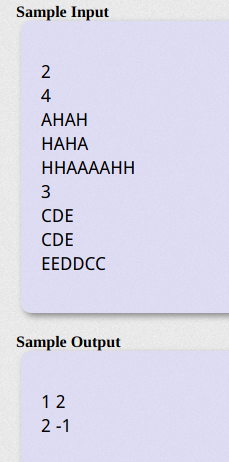题目:
现有字符串s1、s2、s12,其中s1、s2的长度为len,s12的长度为2*len。
是否可以通过一些操作使s1和s2转换合并成s12?
变换的操作规则如下:
假设s1=11111,s2=00000
变换后的序列 s=0101010101
假设s1=12345,s2=67890
变换后的序列 s=6172839405
如果s和s12完全相同,那么输出变换次数
如果不完全相等,s的前半部分作为s1,后半部分作为s2,重复上述过程
输入:
第一行T(1≤T≤1000),代表有T组数据.
每组数据第一行len(1≤len≤100),第二行长度为len的字符串s1,第三行长度为len的字符串s2,第四行长度为2*len的字符串s12。
输出:
首先输出处理数据组的编号(编号从1开始)
再输出变换次数并换行。
注意两个数字之间有空格。
对于变换次数,如果无需变换直接得到s12,那么输出0,如果无论怎么变换都不会得到s12,那么输出 -1。
样例:

分析:简单的模拟,return-1的条件随便给了一个就水过了
#include<iostream> #include<sstream> #include<cstdio> #include<cstdlib> #include<string> #include<cstring> #include<algorithm> #include<functional> #include<iomanip> #include<numeric> #include<cmath> #include<queue> #include<vector> #include<set> #include<cctype> #define PI acos(-1.0) const int INF = 0x3f3f3f3f; const int NINF = -INF - 1; typedef long long ll; using namespace std; string a, b, c; int n; int func() { int num = 0; string temp; temp = a + b; //cout << temp << endl; while (temp != c) { if (num == 2 * n) return -1; a = temp.substr(0, n); b = temp.substr(n, n); //cout << a << ' ' << b << endl; //break; int flag = 0; for (int i = 0; i < n; ++i) temp[flag++] = b[i], temp[flag++] = a[i]; num++; } return num; } int main() { int T, t = 0; cin >> T; while (T--) { t++; cin >> n; cin >> a >> b >> c; int num = func(); cout << t << ' ' << num << endl; } return 0; }